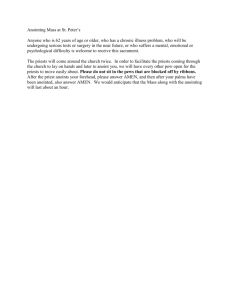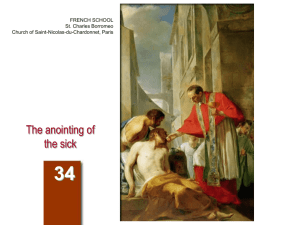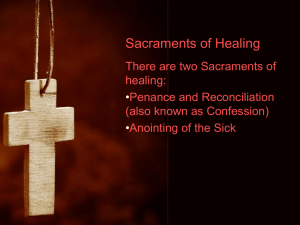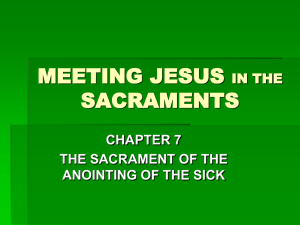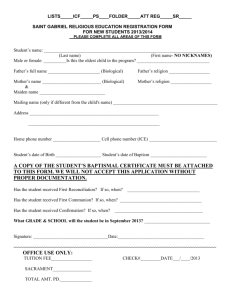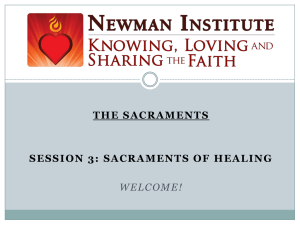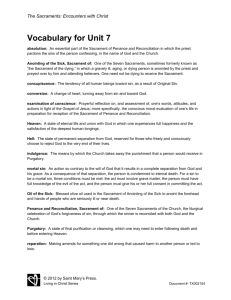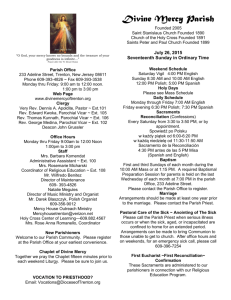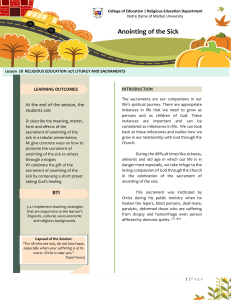Anointing of the Sick Charlton
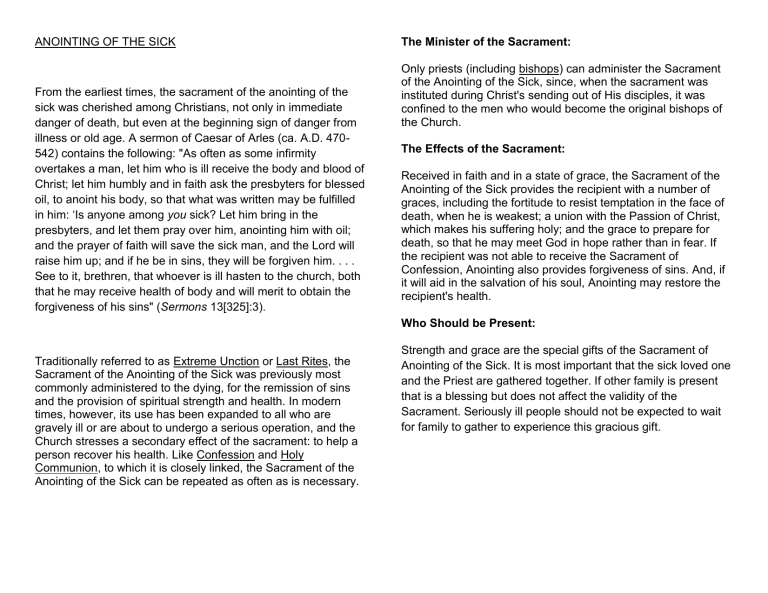
ANOINTING OF THE SICK
From the earliest times, the sacrament of the anointing of the sick was cherished among Christians, not only in immediate danger of death, but even at the beginning sign of danger from illness or old age. A sermon of Caesar of Arles (ca. A.D. 470-
542) contains the following: "As often as some infirmity overtakes a man, let him who is ill receive the body and blood of
Christ; let him humbly and in faith ask the presbyters for blessed oil, to anoint his body, so that what was written may be fulfilled in him:
‘Is anyone among you sick? Let him bring in the presbyters, and let them pray over him, anointing him with oil; and the prayer of faith will save the sick man, and the Lord will raise him up; and if he be in sins, they will be forgiven him. . . .
See to it, brethren, that whoever is ill hasten to the church, both that he may receive health of body and will merit to obtain the forgiveness of his sins" ( Sermons 13[325]:3).
Traditionally referred to as Extreme Unction or Last Rites, the
Sacrament of the Anointing of the Sick was previously most commonly administered to the dying, for the remission of sins and the provision of spiritual strength and health. In modern times, however, its use has been expanded to all who are gravely ill or are about to undergo a serious operation, and the
Church stresses a secondary effect of the sacrament: to help a person recover his health. Like Confession and Holy
Communion, to which it is closely linked, the Sacrament of the
Anointing of the Sick can be repeated as often as is necessary.
The Minister of the Sacrament:
Only priests (including bishops) can administer the Sacrament of the Anointing of the Sick, since, when the sacrament was instituted during Christ's sending out of His disciples, it was confined to the men who would become the original bishops of the Church.
The Effects of the Sacrament:
Received in faith and in a state of grace, the Sacrament of the
Anointing of the Sick provides the recipient with a number of graces, including the fortitude to resist temptation in the face of death, when he is weakest; a union with the Passion of Christ, which makes his suffering holy; and the grace to prepare for death, so that he may meet God in hope rather than in fear. If the recipient was not able to receive the Sacrament of
Confession, Anointing also provides forgiveness of sins. And, if it will aid in the salvation of his soul, Anointing may restore the recipient's health.
Who Should be Present:
Strength and grace are the special gifts of the Sacrament of
Anointing of the Sick. It is most important that the sick loved one and the Priest are gathered together. If other family is present that is a blessing but does not affect the validity of the
Sacrament. Seriously ill people should not be expected to wait for family to gather to experience this gracious gift.
An Act of
Spiritual Communion
My Jesus,
I believe that You are present in the Most Holy Sacrament.
I love You above all things, and I desire to receive You into my soul. Since I cannot at this moment receive
You sacramentally, come at least spiritually into my heart. I embrace You as if You were already there and unite myself wholly to You. Never permit me to be separated from You. Amen.
A PRAYER FOR HEALING
Lord, You invite all who are burdened to come to You. Allow your healing hand to heal him/her .
Touch his/her soul with Your compassion for others.
Touch his/her heart with Your courage and infinite love for all.
Touch his/her mind with Your wisdom, that his/her mouth may always proclaim Your praise.
Teach him/her to reach out to You in his/her need, and help him/her to lead others to You by his/her example.
Most loving Heart of Jesus, bring him/her health in body and spirit that he/she may serve You with all his/her strength.
Touch gently this life which You have created, now and forever.
Amen
PRIESTS OF THE SACRED HEART, HALES CORNERS, WI
